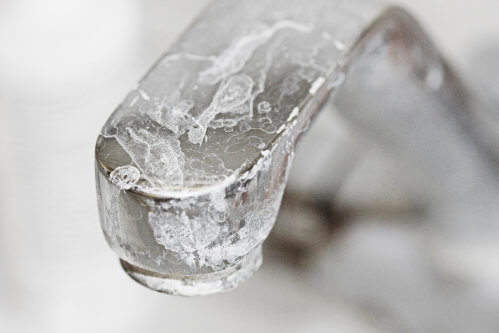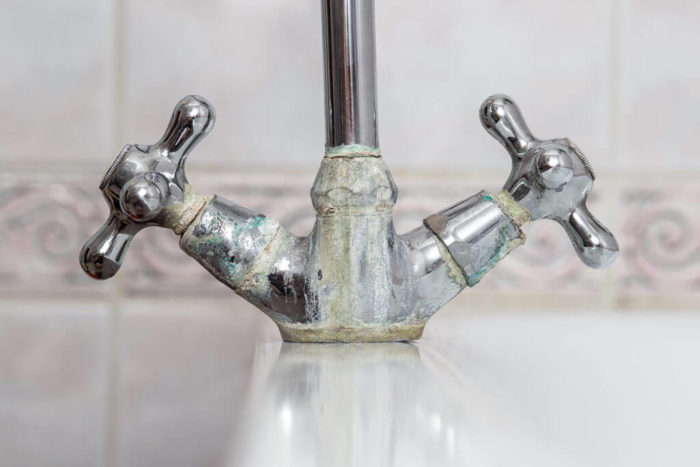How to Remove Hard Water Deposits
Do you scrub your faucets and drains but they never come clean? If your sink and shower fixtures are slowly turning a white grimy mess, you may have hard water deposits. Removing hard water deposits is easy, and can be done by following a few simple steps.

What Are Hard Water Deposits?
Hard water is found in 85% of the United States. It causes unsightly deposits and rings in bathtubs, toilets, showers, sinks and around the base of faucets and fixtures.
Hard water has a high concentration of minerals such as calcium and magnesium ions. Hard water deposits occur when this mineral heavy water evaporates, leaving a residue on the surfaces it touches.
The Water Quality Association considers water to be hard if it has more than 17.1 parts per million (ppm) or 1 grains per gallon (GPG).
Can Hard Water Deposits Cause Problems?
Yes, hard water deposits can cause a wide range of problems which is why it’s important to clean them as soon as possible, or take care of the problem at the source by purchasing a water softener.
1. Hard water can cause your water to taste funny. This is often one of the first clues you have a hard water problem. Your water can taste too metallic, like rotten eggs, or dirt.
2. Hard water can cause stains. Porcelain stains are unsightly, but if your water contains too much iron, expect to see orange stains until the problem is taken care of.
3. Hard water can cause excessive amounts of soap scum. Soap and the minerals in hard water just don’t go together. You may notice soap scum accumulating on the bottom of your shower curtain, or even spots on your dishes after being cleaned in the dishwasher.
4. Hard water can cause a poor shower experience. Because minerals cause hard water to react ineffectively with soap, it makes it difficult to get a good lather during a shower. It also makes it more difficult to wash all the soap off your body, leaving a soapy feeling on your skin.
5. Hard water can cause poor water pressure. Minerals can block your pipes, faucets and shower heads, meaning your water pressure could suffer.
6. Hard water can cause blockages in pipes. Most common with older, steel pipes, hard water can cause major plumbing issues. When deposits build up inside your pipes, it constricts the flow of water, eventually leading to backups that can only be fixed by a plumber.
7. Hard water can prevent your clothes from getting clean. Again, because of soap reacting poorly with hard water, your clothes can look dingy and worn out.
8. Hard water can cause skin irritation. Because washing in hard water will leave a film of soap behind, it can cause your skin to become dry, flaky and irritated. Hard water could cause eczema symptoms to worsen, or even cause eczema.
9. Hard water can cause your appliances to wear out. A buildup of sediment in your water heater can cause it to work harder. The same goes for other appliances such as your dishwasher, ice maker, and washing machine. Poor efficiency can increase your utility bills.
10. Hard water can cause permanent damage to glass shower doors. Hard water can get so bad that it actually etches the glass on your shower doors. If your shower doors have a cloudy residue that won’t come clean, this could be the case.
How to Remove Hard Water Deposits

It’s best to clean hard water deposits and stains as soon as you notice them. That way, they won’t have a chance to penetrate the surface. Here are a few cleaning methods:
- Mix half water and half vinegar in a spray bottle.
- Spray the mixture in your tub and shower and let the solution sit for a few minutes before wiping clean.
You can also try removing hard water stains with a paste made from baking soda and vinegar.
- Place the paste over the surface of the mineral deposit and let sit for ten to 20 minutes.
- After the mixture has settled in, use a scrub brush to deep clean, then rinse.
- Wipe everything dry immediately so the hard water doesn’t sit on the surface and cause more mineral deposits.
You can also try acidic lemon juice to remove hard water deposits.
- Spray fresh lemon juice on hard water deposits on faucets.
- Rinse after ten minutes. Don’t forget to wipe the area clean afterward.
How to Prevent Hard Water Deposits
Prevention is important when it comes to keeping mineral deposits at bay.
1. As mentioned above, don’t let water dry on surfaces if you want to prevent hard water deposits. Mineral deposits are left behind when water evaporates, so wiping everything dry is important to prevent stains. On glass shower doors, you can use a rubber squeegee to remove the water left behind.
2. Use a cleaner on shower doors to prevent cloudiness. You can either squeegee your shower doors or spray them with a cleaner after every use.
3. Install a water softener to prevent hard water at the source. A water softener puts a stop to hard water before it’s distributed throughout your plumbing system.
